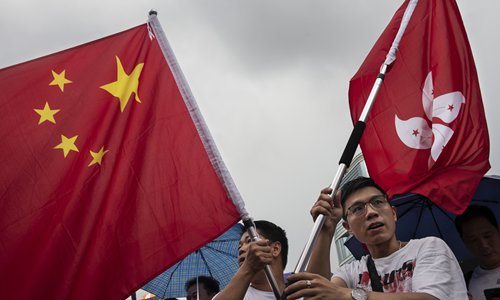HOME >> OPINION,SPECIAL-COVERAGE
Hong Kong youth’s future hinges on mainland
Source:Global Times Published: 2019/7/30 23:13:41

Photo: IC
A majority of protesters in Hong Kong are young, some of whom are still college undergraduates. Do they know what they are doing? Probably not.When a group of people feel dissatisfied and lost, slogans such as "democracy" and "freedom" allow them to blow off some steam on the streets. It is hard for these people to realize that they have become mobs manipulated by extreme political forces and that they are destroying their own future.
The most extreme protesters held the national flags of the US and the UK and called the Chinese mainland "Shina," a highly derogatory term used by Japanese invaders in World War II.
Their ignorance of history cannot help shape their values. As the culture of colonialism has constantly impacted on their national identity, they refuse to accept the fact that they are descendants of the Chinese nation but fantasize being part of the Western world.
When Hong Kong was under British rule, it made full use of geographical advantages and became one of the most developed regions in Asia. After the coastal area of the mainland narrowed the economic gap with Hong Kong, some Hongkongers with a superiority complex couldn't accept it and attributed the challenges they face to China resuming sovereignty over Hong Kong.
Some young Hongkongers think absolute democracy is what they should pursue. Incited by the West, they clash with police officers and attack them using bricks and slingshots. They are doing what Hongkongers have never done before. This makes them feel closer to the West.
It will be so easy to achieve prosperity if violence on the streets can generate a brilliant future. From Ukraine to South America, many young people took to the streets to wreak havoc, but none of them has been heading for a better future since then.
The future of young people hinges on social development. The lives of young Hongkongers depend on whether they can be integrated into the most dynamic development wave in the region. The biggest engine for the development of East Asia and the Asia-Pacific region is the mainland.
Fortunately, Hong Kong's return to the motherland came at a time of China's rise. Asia and the world are strengthening their ties and seeking closer economic interaction with China. Hong Kong thus gained a unique advantage: the "one China, two systems" policy has granted it a high degree of autonomy while allowing it to be among the first to hitch a ride on the mainland's development.
This is the direction and roadmap for young Hongkongers to move forward. Developed cities around the world face common problems, such as the widening wealth gap and skyrocketing home prices. But the mainland is not the cause of these problems in Hong Kong. In fact, it's where Hong Kong can find resources to solve these problems.
Regrettably, for various internal and external reasons, some Hongkongers have deviated from their lifeline, misled by extreme opposition and Western forces to get embroiled in a political struggle. They are trapped in it and cannot find a way out. It's hoped they will be able to broaden their vision, see things in the true light and work with the country's help and guidance to Hong Kong.
Newspaper headline: HK youth’s future hinges on mainland
Posted in: EDITORIAL,COMMENTS